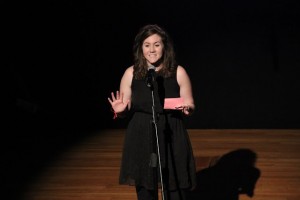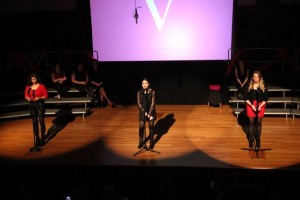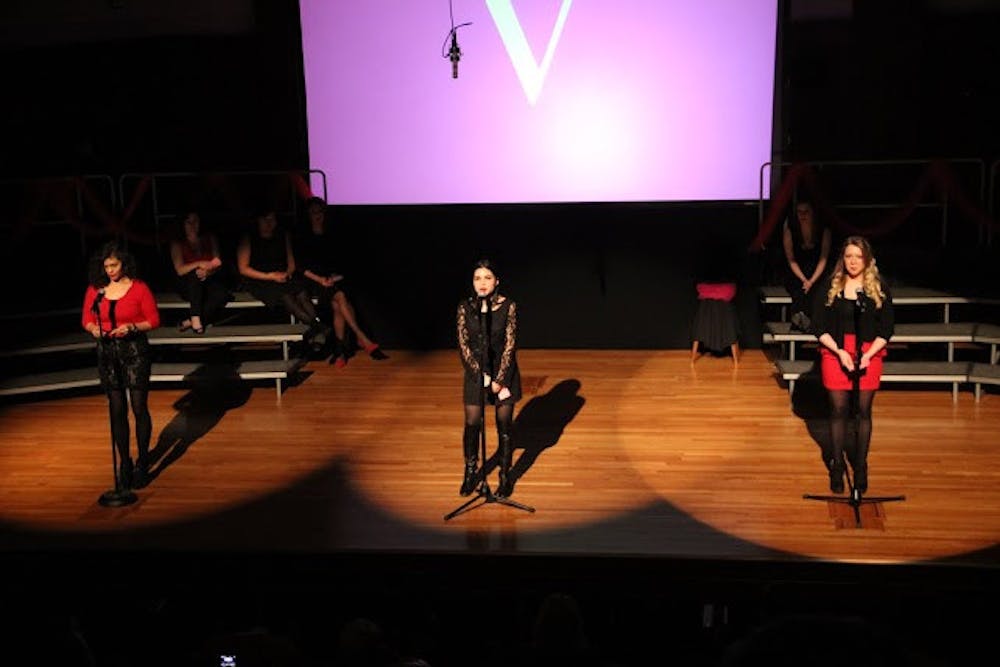By Lily Kalczewski
Correspondent
The College’s Women in Learning and Leadership (WILL) presented Eve Ensler’s “The Vagina Monologues” on Feb. 20 and Feb. 22. Composed of 25 female performers, this production was originally adapted from Ensler’s play in which she interviewed over 200 women from all sizes and ethnicities asking them questions about their vaginas. At first the women were hesitant in their responses. However, as the interview continued on, they actually felt relieved to finally have an opportunity to talk about their vaginas.
The production started out with a video focusing on the One Billion Rising Revolution, in which people from around the world raise awareness of gender violence through dance. India, London, Kenya, Palestine, Italy and California, to name a few, were all participants in rising for justice. After watching the video, it is obvious the fight against gender violence and inequality has become a global phenomenon. People are speaking out and fighting back.
Prepared for the bold, the straightforward and the uncomfortable, the monologues opened with three women on stage who stated, “We were worried about our own vaginas.” The stories that ensued were humorous, raw, enlightening and tragic.

Listening to sophomore history and secondary education major Katie McLaughlin perform “The Flood,” the audience couldn’t stop laughing. The story is about a 72-year-old woman’s experience about having never seen her vagina and having been embarrassed of it. McLaughlin emulated her character well with a very believable New York accent.
“I was not very nervous before my monologue,” McLaughlin said. “I think it was in part due to my character. She is such a strong and confident woman, how could I not be as well when performing her?”
The audience’s laughter continued as freshman journalism major Brianna Sheppard performed “My Vagina is Angry.” She loudly proclaimed women’s distaste for tampons, gynecologist appointments and thong underwear.
“My vagina wants kindness, change, freedom... and chocolate,” she said.
Then, progressing back to a more serious tone, senior elementary education ISTEM major Kelsey Snedeker performed “My Vagina is My Village,” which was about the story of a Nigerian refugee who was raped and genitally mutated by soldiers.
“They invaded it. Butchered it and burned it down. I do not touch now,” she said during her monologue.
Transgender issues were also addressed. Junior communication studies and interactive multimedia major Folake Ayiloge was among three other women who performed “They Beat the Girl Out of My Boy…Or So They Tried.” Ayiloge is a veteran of the monologues, having originally been part of the stage crew as a freshman, and performing last year.
“The opportunity to share another woman’s story about her fight to be accepted for whom she really is,” Ayiloge said.

In the monologue, the interviewee had said, “it’s as random as being adopted or being assigned a hotel room on the 30th floor. It has nothing to do with who you are or your fear of heights, but in spite of the apparatus I was forced to carry around, I always knew I was a girl.”
The weekend also featured the “2015 Vagina Warriors” — individuals who have demonstrated outstanding work in ending violence against women. This years honorees included alumna Emily Juricek, junior English and women’s and gender studies double major Jennie Sekanics and the School of Business Women’s Leadership Commitee.
After senior history and English double major Alexa Logush closed out the evening with a powerful performance of “I Was There in the Room,” it was clear how important the Monologues were. This production has allowed women to embrace their sexuality, feel proud of their vagina and share their stories. It became apparent in many of the monologues that although their vagina was a part of their body, to these women, it was foreign.
“We live in a society where it is still uncomfortable for women to talk about or embrace their womanhood,” McLaughlin said.
She continued on to say that although the monologues are “perceived as being forward and brash,” this shouldn’t be the case. Women shouldn’t be ashamed of their vaginas — they should be confident. After the performance was over, members of the audience were asked to stand up if they or anyone they knew had ever been physically beaten or violated. Some people rose. Then the remaining members of the audience were asked to stand if they were going to help end the violence. Everyone stood. Meant to inspire and induce change, this powerful performance succeeded in every way.







